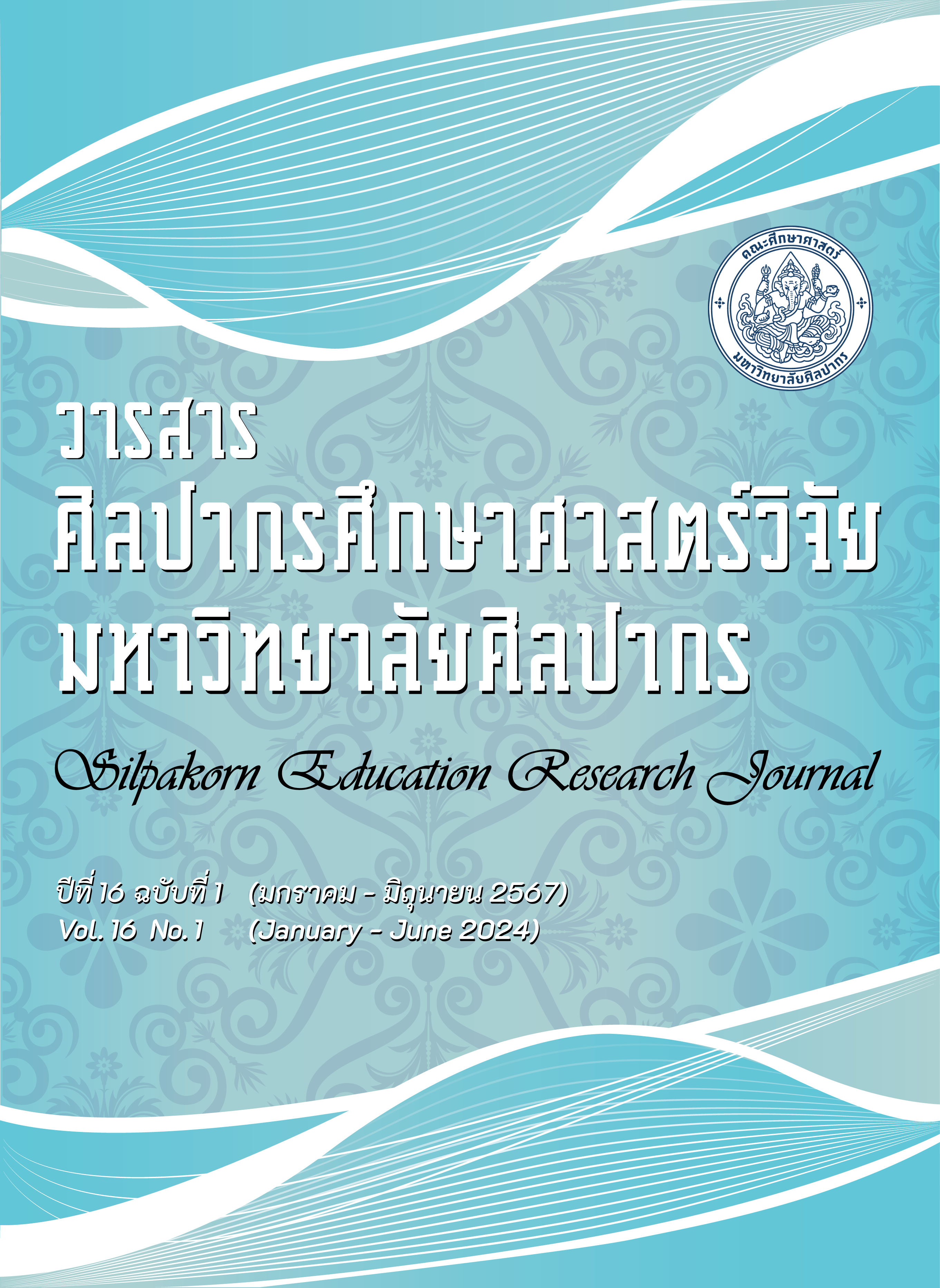การพัฒนารูปแบบการเรียนการสอนเพื่อส่งเสริมจริยธรรมวิชาชีพเทคโนโลยีการศึกษาสำหรับสถาบันอุดมศึกษา
คำสำคัญ:
รูปแบบการเรียนการสอน, จริยธรรม วิชาชีพ, เทคโนโลยีการศึกษาบทคัดย่อ
การวิจัยครั้งนี้มีวัตถุประสงค์เพื่อ 1) เพื่อศึกษาสภาพการเรียนการสอนเพื่อส่งเสริมจริยธรรมสำหรับนักเทคโนโลยีการศึกษา 2) เพื่อพัฒนารูปแบบการออกแบบการเรียนการสอน กลุ่มตัวอย่างที่ใช้ในการวิจัยครั้งนี้ คือ นักศึกษาระดับปริญญาตรี คณะศึกษาศาสตร์ มหาวิทยาลัยศิลปากร จำนวน 30 คน ได้จากการสุ่มอย่างง่าย เครื่องมือที่ใช้ในการวิจัยประกอบด้วย 1) แบบสอบถามสำหรับผู้เชี่ยวชาญ 2) แบบสอบถามสำหรับผู้เรียน 3) รูปแบบการออกแบบการเรียนการสอนฯ 4) แบบประเมินรูปแบบและแผนการจัดการเรียนรู้ 5) แบบประเมินผลสัมฤทธิ์ทางการเรียน 6) แบบประเมินพฤติกรรมจริยธรรม 7) แบบประเมินผลงาน เก็บรวบรวมข้อมูลทั้งเชิงปริมาณและคุณภาพ วิเคราะห์ข้อมูลโดยใช้สถิติ ค่าความถี่ ร้อยละ ค่าเฉลี่ยส่วนเบี่ยงเบนมาตรฐาน
ผลการศึกษาพบว่า 1) ผลการศึกษาความคิดเห็นในการพัฒนารูปแบบ ควรบูรณาการเนื้อหากับวิชาชีพทางด้านเทคโนโลยีการศึกษาในยุคปัจจุบัน จัดการเรียนการสอนด้วยกรณีศึกษา โดยกำหนดประเด็นจากข่าวสารในชีวิตประจำวัน การใช้ปัญหาและการอภิปรายร่วมกันและส่งผลต่อการตัดสินใจและแสดงออกถึงพฤติกรรมจริยธรรม 2) รูปแบบฯ มีองค์ประกอบ คือ (1) บทบาทผู้สอน (2) บทบาทผู้เรียน (3) เนื้อหาการจัดการเรียนการสอน (4) วิธีสอน (5) กิจกรรมการเรียนการสอน (6) แหล่งเรียนรู้ (7) การประเมินผล โดยมีผลการประเมินในภาพรวมอยู่ในระดับมากที่สุด ขั้นตอนประกอบด้วย (1) ศึกษาความต้องการในการจัดการเรียนการสอนฯ (2) วิเคราะห์ผู้เรียน ผู้สอน (3) วิเคราะห์บริบทและสภาพแวดล้อมการเรียนรู้ เนื้อหา การบูรณาการการเรียนการสอน (4) กำหนดเนื้อหาตามวัตถุประสงค์ (5) ออกแบบสื่อการสอน กิจกรรม สิ่งแวดล้อมการเรียนรู้ และการวัดและประเมินผล (6) พัฒนาสื่อการสอน กิจกรรม สิ่งแวดล้อมการเรียนรู้ (7) ดำเนินการจัดการเรียนการสอน (8) การวัดและประเมินผลจริยธรรม โดยมีผลการประเมินคุณภาพของรูปแบบในภาพรวมอยู่ในระดับมากที่สุด รูปแบบมีประสิทธิภาพตามเกณฑ์ที่กำหนดไว้
เอกสารอ้างอิง
Association for Educational Communications and Technology. (2012). AECT Standards 2012 Version. [Online]. Retrieved January 22, 2021, from http://aect.site-ym.com/resource /resmgr /AECT_Documents / AECTstandards2012.pdf
Autthaporn, J. and Koraneekid, P. (2014). “Development of An Active Online Instructional Model to Enhance The Learning Behavior of Undergraduate Students”. An Online Journal of Education 9(4): 123–137. [Online]. Retrieved July 22, 2021, from https://so01.tci thaijo.org /index.php/OJED/article/view/20697
Bangthamai, E. (2018). “The Effects Of E-Learning Model Integrating Inquiry Based Learning And Project Based Learning To Enhance Learning Achievement And Photography Ability For Undergraduate Students”. Veridian E-Journal Silpakorn University 11(4): 745-762. (in Thai)
Brahmawong, C. (2013). “Developmental Testing of Media and Instructional Package”. Silpakorn Educational Research Journal 5(1): 7-20. (in Thai)
Chaicharoen, S. (2016). Instructional Design, Principles, Theories towards Practices 2nd ed. Khon Khean: Department of Educational Technology, Faculty of Education, Khon Khean University. (in Thai)
Joyce, B. and Weil, M. (1996). Model of Teaching. Englewood Cliffs: Prentice – Hall International Editions.
Kantunyaluk, P. (2014). Development of Blended Learning Model with Problem Solving and Synectics Technique to Promote Ability to Solve Problems in Creative Ways of Teaching Students. Doctor of Educational Thesis Program Curriculum and Teaching, Curriculum and Teaching Program Faculty of Education Silpakorn University. (in Thai)
Kemp, J. E. , Morrison, G. R. , Ross, S. M. , and Kalman, H. K. ( 2 0 1 0 ) . Designing Effective Instruction. 6th ed. The United State of America: Wiley.
Khammanee, T. (2013). Varieties of Alternative Instructional Model. 10th ed. Bangkok: Chulalongkorn University Press. (in Thai)
Kowatrakul, S. (2016). Educational Psychology. 12nd ed. Bangkok: Chulalongkorn University Press. (in Thai)
Meekhun, K. (1990). Measuring Ethics. Bangkok: Srinakharinwirot University Press. (in Thai)
Nilsook, P. and Wannapiroon, P. (2014). “Blended Management Learning: Blended Ratio”. Journal of Technical Education Development 25(85): 31-36. (in Thai)
Office of the National Economic and Social Development Board. (2016). The Eleventh National Economic and Social Development Plan 2017 – 2021. [online]. Retrieved July 22, 2021, from https://www.nesdc.go.th/ewt_dl_link.php?nid=6422
Office of the Educational Council. (2017). The 12th Education Development Plan of the Ministry of Education B.E. 2560 –2564. Bangkok : Pik Wan Graphic Co., Ltd. (in Thai)
Office of The Higher Education Standard Board. (2009). Thai Qualifications Framework for Higher Education 2009. Bangkok: Commission on Higher Education. (in Thai)
Piskurich, G. (2006). Rapid Instructional Design. San Francisco. CA, USA: Pfeiffer, John Wiley and Sons, Inc.
Ruangrit, N. (2018). “The Research and Development of Instructional Design Model for Massive Open Online Course in Higher Education for Educational Course”. Veridian E-Journal Silpakorn University 11(4): 950-961. (in Thai)
Sureerattanan, N., Shoudumrong, W. and Runglawan, P. (2008). “A Study of Ethical Requirement for Computer Curriculum in Higher Education”. The 1st Nation Conference of Technical Education 2008: 534-542.
Suvarnaphaet, P. (2014). Development of Blended Instruction by Using Problem-Based Learning and Inquiry-Based Learning to Enhance Expectations in Physics Subject for Undergraduate Students. Doctor of Educational Thesis Program Curriculum and Teaching, Curriculum and Teaching Program Faculty of Education Silpakorn University. (in Thai)
Williams, B. (2005). “Case Based Learning a Review of The Literature: is There Scope for This Educational Paradigm in Prehospital Education?”. Emergency Medicine Journal: EMJ 22(8): 577–581





